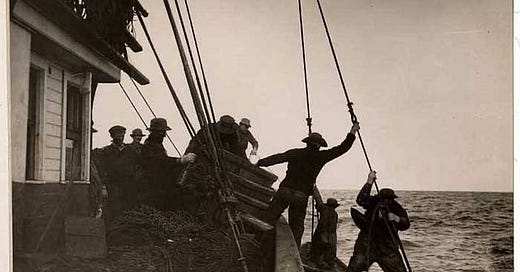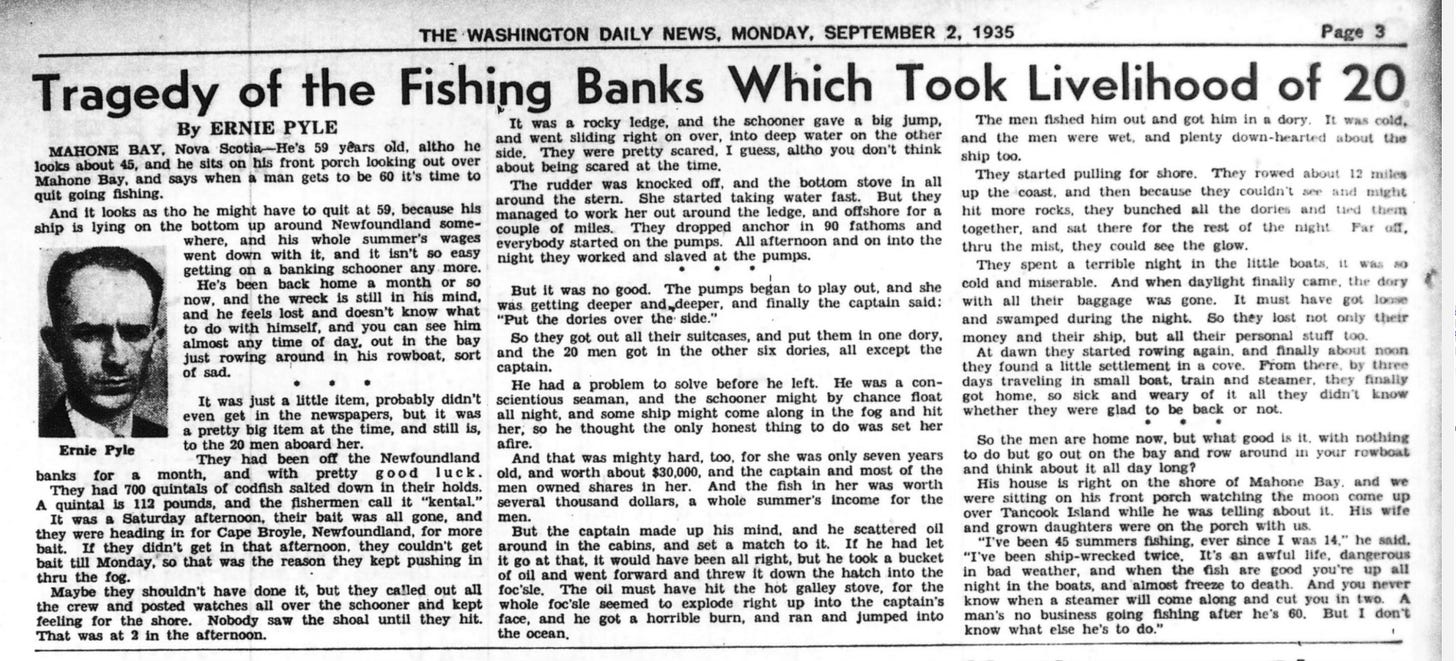The Washington Daily News, Monday, September 2, 1935
Tragedy of the Fishing Banks Which Took Livelihood of 20
By Ernie Pyle
MAHONE BAY, Nova Scotia—He's 59 years old, altho he looks about 45, and he sits on his front porch looking out over Mahone Bay, and says when a man gets to be 60 it’s time to quit going fishing.
And it looks as tho he might have to quit at 59, because his ship is lying on the bottom up around Newfoundland somewhere, and his whole summer’s wages went down with it, and it isn’t so easy getting on a banking schooner any more.
He's been back home a month now, and the wreck is still in his mind, and he feels lost and doesn’t know what to do with himself, and you can see him almost any time of day, out in the bay just rowing around in his rowboat, sort of sad.
● ● ●
It was just a little item, probably didn’t even get in the newspapers, but it was a pretty big item at the time, and still is, to the 20 men aboard her.
They had been off the Newfoundland banks for a month, and with pretty good luck. They had 700 quintals of codfish salted down in their holds. A quintal is 112 pounds, and the fishermen call it "kental."
It was a Saturday afternoon, their bait was gone, and they were heading in for Cape Broyle, Newfoundland, for more bait. If they didn't get in that afternoon, they couldn’t get bait till Monday, so that was the reason they kept pushing in thru the fog.
Maybe they shouldn’t have done it, but they called out all the crew and posted watches all over the schooner and kept feeling for the shore. Nobody saw the shoal until they hit. That was at 2 in the afternoon.
It was a rocky ledge, and the schooner gave a big jump, and went sliding right on over, into deep water on the other side. They were pretty scared, I guess, altho you don't think about being scared at the time.
The rudder was knocked off, and the bottom stove in all around the stern. She started taking water fast. But they managed to work her out around the ledge, and offshore for a couple of miles. They dropped anchor in 90 fathoms and everybody started on the pumps. All afternoon and on into the night they worked and slaved at the pumps.
● ● ●
But it was no good. The pumps began to play out, and she was getting deeper and deeper, and finally the captain said: "Put the dories over the side."
So they got out all their suitcases, and put them in one dory, and the 20 men got in the other six dories, all except the captain.
He had a problem to solve before he left. He was a conscientious seaman, and the schooner might by chance float all night, and some ship might come along in the fog and hit her, so he thought the only honest thing to do was set her afire.
And that was mighty hard, too, for she was only seven years old, and worth about $30,000, and the captain and most of the men owned shares in her. And the fish in her was worth several thousand dollars, a whole summer’s income for the men.
But the captain made up his mind, and he scattered oil around in the cabins, and set a match to it. If he had let it go at that, it would have been all right, but he took a bucket of oil and went forward and threw it down the hatch into the foc'sle. The oil must have hit the hot galley stove, for the whole foc'sle seemed to explode right up into the captain’s face, and he got a horrible burn, and ran and jumped into the ocean.
The men fished him out and got him in a dory. It was cold, and the men were wet, and plenty down-hearted about the ship too.
They started pulling for shore. They rowed about 12 miles up the coast, and then because they couldn’t see and might hit more rocks, they bunched all the dories and tied them together, and sat there for the rest of the night. Far off, thru the mist, they could see the glow.
They spent a terrible night in the little boats, it was so cold and miserable. And when daylight finally came, the dory with all their baggage was gone. It must have got loose and swamped during the night. So they lost not only their money and their ship, but all their personal stuff too.
At dawn they started rowing again, and finally about noon they found a little settlement in a cove. From there, by three days traveling in small boat, train and steamer, they finally got home, so sick and weary of it all they didn't know whether they were glad to be back or not.
● ● ●
So the men are home now, but what good is it, with nothing to do but go out on the bay and row around in your rowboat and think about it all day long?
His house is right on the shore of Mahone Bay, and we were sitting on his front porch watching the moon come up over Tancook Island while he was telling about it. His wife and grown daughters were on the porch with us.
"I've been 45 summers fishing, ever since I was 14," he said. "I’ve been ship-wrecked twice. It's an awful life, dangerous in bad weather, and when the fish are good you’re up all night in the boats, and almost freeze to death. And you never know when a steamer will come along and cut you in two. A man’s no business going fishing after he's 60. But I don't know what else he's to do."
💛 **Enjoyed this post?** Your support helps us continue to transcribe and promote Ernie’s work. Please click the link below to donate.






Good one Ernie